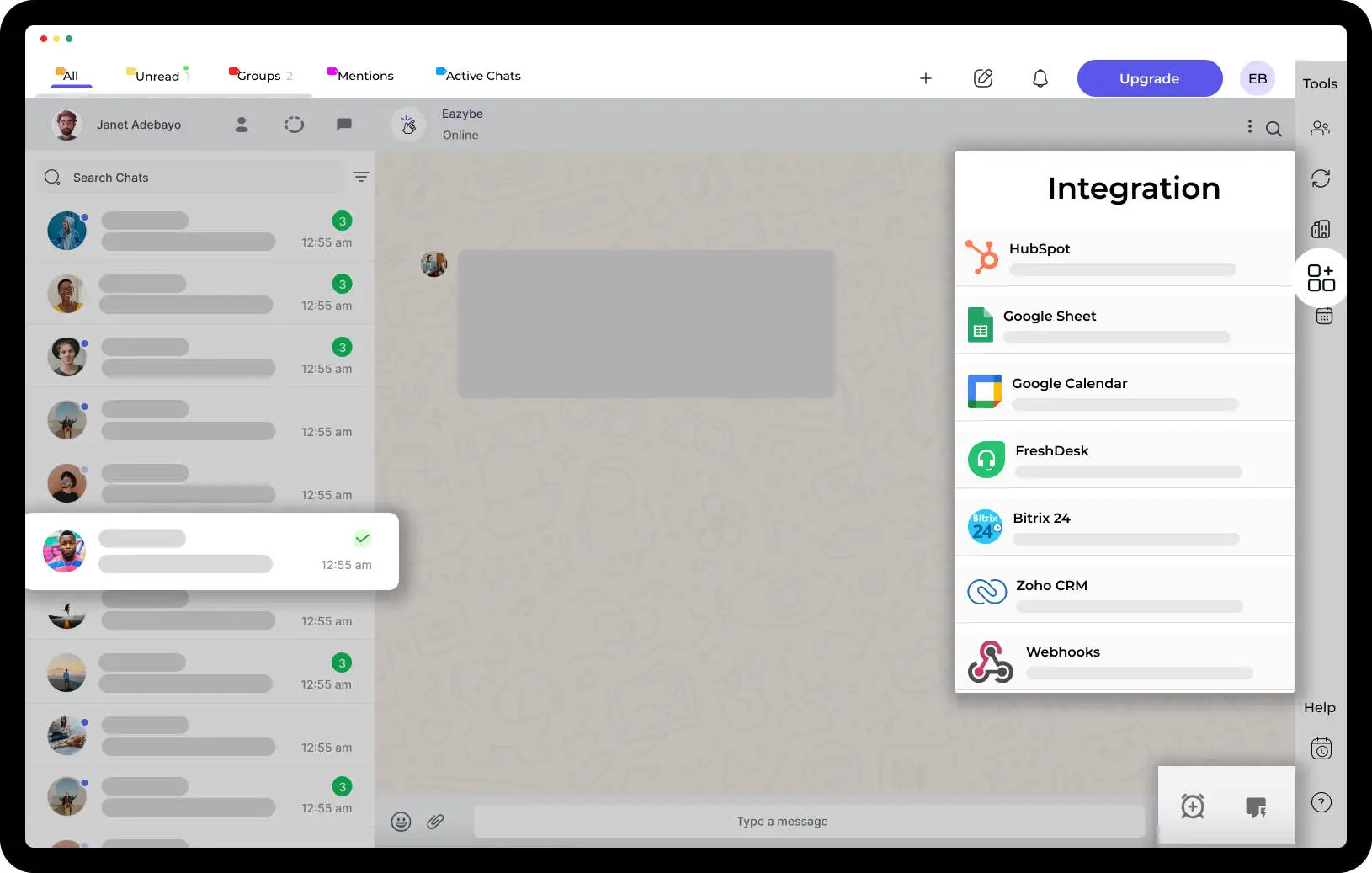
Elevate Results: WhatsApp Integration for CRM Success

Key Highlights
- Integrating WhatsApp with your CRM system can significantly enhance customer communication and satisfaction.
- It provides a seamless platform for managing interactions, automating messages, and gaining valuable insights from customer data.
- This integration is particularly beneficial for businesses seeking to streamline sales processes, improve customer support, and boost marketing ROI.
- By leveraging WhatsApp's extensive reach and engagement, businesses can establish stronger customer relationships and drive growth.
- Discover how WhatsApp CRM integration can revolutionize your business communication and unlock new levels of customer engagement.
Introduction
In today's digital world, providing a great customer experience is very important. Businesses always look for new ways to improve their CRM systems. WhatsApp integration has become a key tool for this. It gives a direct and personal way to connect with customers. This change helps businesses make communication easier, improve customer support, and increase overall efficiency.
The Importance of CRM in Modern Business
Customer Relationship Management (CRM) is very important for helping businesses grow. It allows companies to manage and understand customer data well. This helps them learn about customer behavior, preferences, and what they buy. With this knowledge, businesses can create better and more meaningful connections with their customers.
Using CRM systems, companies can group their audience, personalize their interactions, and adjust what they offer to fit customer needs. This focus on the customer leads to more satisfaction and loyalty. As a result, it supports long-term business growth. Today, having a strong CRM system is essential for any business that wants to succeed in a competitive market.
Understanding Customer Relationship Management (CRM)
Customer Relationship Management (CRM) is very important for making customers happy and improving their experience. A good CRM system keeps customer data in one place, helps communication flow smoothly, and builds strong customer relationships. When businesses add WhatsApp to their CRM platform, they can get valuable insights, speed up response times, and boost customer engagement. This easy integration takes customer communication to the next level. It helps meet customer needs quickly and effectively. Knowing about CRM is crucial for businesses that want to enhance their customer interactions and support business growth.
The Evolution of CRM with Digital Communication Channels
Business communication has changed a lot because of digital communication channels. Now, companies can use email, social media, instant messaging, and chatbots to connect with their customers. Because of this change, there is a need for CRM integration with these digital channels. This helps create a smooth and unified customer experience.
When businesses integrate their CRM with channels like WhatsApp, they can bring together customer interactions. This means a consistent brand experience can happen at every point of contact. Customers can start chats on the channels they prefer, and businesses can manage these conversations in their CRM system. This ensures that no message is missed.
This integration allows businesses to use customer data and insights from their CRM. They can personalize their messages on digital channels. Whether it is about sending targeted promotions, giving quick support, or keeping in touch, companies can use these channels to create stronger relationships with their customers.
WhatsApp Integration: A Game Changer for CRM Systems
WhatsApp CRM integration is changing how businesses connect with customers. It offers a direct and personal way to talk and build relationships. WhatsApp has a huge global reach and high engagement rates. Because of this, it is a key tool for businesses that want to improve communication and customer experience.
By adding WhatsApp to their CRM systems, businesses can use its features to send personal messages, offer real-time support, automate tasks, and get valuable insights from customer interactions.
How WhatsApp Integration Enhances Customer Engagement
One key benefit of WhatsApp CRM integration is better customer engagement. WhatsApp’s instant messaging lets businesses talk with customers in real time. This quick response helps solve questions and concerns easily. As a result, customers are more satisfied.
Additionally, WhatsApp integration helps businesses gather valuable insights from customer chats. By looking at how people communicate and what they say, companies can understand customer needs and preferences better. These insights help them create better products, services, and marketing campaigns that connect with their audience.
Using WhatsApp's multimedia features, businesses can improve the customer experience. They can share images, videos, and documents easily. This makes sharing information better, whether it’s about product demos, order confirmations, or support services.
Streamlining Sales and Support with WhatsApp CRM
WhatsApp CRM integration is very important for making sales and support processes easier. It helps businesses turn leads into customers and serve them well. Sales teams can use WhatsApp to talk with leads, answer questions about products, share custom offers, and guide them through the sales process without any hassle.
WhatsApp also helps customer support teams provide fast and personal help to customers, no matter where they are or what time it is. When they connect WhatsApp with their CRM system, support agents can see customer data, check past interactions, and give solutions based on this information. This leads to quicker answer times and happier customers.
This integration improves teamwork. Many team members can see shared inboxes, check conversation history, and work together to solve customer problems. This team approach speeds up communication and ensures everyone has the right information to offer great support.
Key Benefits of Integrating WhatsApp into Your CRM Strategy
Integrating WhatsApp into your CRM strategy has many benefits. It helps meet different business needs. These include improving customer service, nurturing leads, increasing conversion rates, and boosting revenue. When you connect with customers on a platform they like, it enhances engagement and builds trust.
Also, automating common tasks can save time. You can send appointment reminders, order confirmations, and delivery updates automatically. This lets your team focus on building relationships and giving personalized experiences that strengthen customer loyalty.
Real-time Customer Service and Support
One big benefit of WhatsApp CRM integration is the chance to offer real-time customer service and support. You can reply to customer questions instantly, which helps solve issues fast and well. You can also set up quick replies and automated messages to handle common questions. This way, customers get help 24/7, and wait times are shorter even when your business is closed.
WhatsApp communication makes it possible to have personal and caring interactions. Support agents can use the customer’s name and refer to what they ordered before. This helps them give solutions that fit the customer’s needs. This personal approach makes customers happy and helps build good relationships.
Here’s how WhatsApp helps with real-time customer service:
- Instant Responses: Answer customer inquiries right away, reducing wait times.
- Proactive Support: Send updates, reminders, and notifications about orders or appointments.
- Personalized Solutions: Use customer data to create tailored solutions.
Enhanced Sales Processes and Lead Generation
WhatsApp CRM integration is not only good for customer support; it can really help your sales and lead generation. Businesses can use WhatsApp to start chats with potential customers. They can also give personalized product recommendations based on what customers looked at. Plus, special promotions can motivate people to buy.
Adding WhatsApp to your sales pipeline helps you track leads. You can keep an eye on how engaged they are and nurture them well. You can set up automated messages to follow up at certain times. This keeps leads informed and guides them towards making a purchase.
By looking at how customers behave on WhatsApp, businesses can learn a lot about what customers like and their buying habits. This information helps improve sales strategies. You can reach the right audience with offers that matter to them, which can boost conversion rates.
Improved Customer Retention and Loyalty
Customer retention is important for business growth. WhatsApp CRM integration helps create stronger relationships and loyalty. By keeping in touch regularly, businesses can remind customers of their brand and show they care.
Personalized messages for birthdays, anniversaries, or special events show attention to detail. Feedback forms and surveys can be sent easily through WhatsApp. This lets customers share their thoughts and suggestions, which helps improve products and services.
Here’s how WhatsApp CRM integration helps with customer retention:
- Personalized Communication: Sending tailored messages shows you value your customers.
- Proactive Engagement: Keep customers updated with news, special offers, and loyalty program benefits.
- Easy Feedback Collection: Get feedback, address concerns, and prove you are always trying to improve.
Setting Up WhatsApp Integration for CRM Success
Successfully adding WhatsApp to your CRM system needs good planning. You should pick the right tools and understand how the WhatsApp Business API can connect your CRM to WhatsApp.
Start by selecting a CRM solution that can easily work with the WhatsApp Business API. This way, all your customer data, interactions, and communications will be saved in one central place and easily accessed.
Essential Requirements for WhatsApp CRM Integration
Before initiating the integration process, ensure you have the following in place:
- WhatsApp Business Account: A WhatsApp Business Account is essential for accessing the WhatsApp Business API, which allows for integration with your CRM system.
- CRM System: Choose a CRM platform that aligns with your business needs and offers seamless integration capabilities with WhatsApp.
- Consent to Communicate: Always obtain explicit consent from your customers before sending them messages on WhatsApp.
Feature
Description
WhatsApp Business Account
Enables access to the WhatsApp Business API.
CRM System
Choose a CRM platform that supports WhatsApp integration.
Customer Consent
Obtain explicit permission from customers to communicate via WhatsApp.
Step-by-Step Guide to Implementing WhatsApp into CRM
Once you have the basic things ready, the next steps for implementation are:
- Choose a WhatsApp Business Solution Provider (BSP): Pick a BSP that fits your business needs and budget.
- Connect Your WhatsApp Account to Your CRM: You'll need to create API keys and set up the connection in your CRM.
- Define Your Communication Strategies: Decide how you will use WhatsApp to improve your current communication strategies, whether for sales, support, or marketing.
Best Practices for Leveraging WhatsApp CRM Integration
To keep customers happy and make the most of WhatsApp CRM integration, you should follow some best practices. Your messages need to be smart, timely, and fit what the customer wants.
Break down your audience into groups to make your marketing plans more personal. Use data to check how well your efforts are working. Look at customer feedback and change your WhatsApp communication strategies often to meet changing goals in your business.
Personalizing Customer Interactions
Use the customer data from your CRM system to make your communication personal. Call customers by their names. Change your messages based on their past interactions or purchase history. Group your audience based on details like age, location, or interests to make your messages more targeted.
You can also personalize product recommendations based on what customers have browsed or bought before. When you know customer preferences and behaviors, you can suggest items they will like. This will improve their shopping experience and boost sales and customer satisfaction.
Keep in mind that personalization means more than just using names. It means understanding each customer's unique needs and updating how you communicate with them based on that understanding.
Automating WhatsApp Conversations for Efficiency
Automating WhatsApp conversations can help improve how well your business works. It can also make customer experiences more consistent. You can set up automated messages for common questions such as order status updates, shipping information, or appointment reminders.
You can use chatbots with your WhatsApp Business account to answer basic customer queries, qualify leads, or book appointments. This will allow your human agents to work on more complex problems. This approach not only speeds up response times but also makes your service available 24/7.
It's important to find a balance between automation and personalization. Automating routine tasks is helpful, but make sure customers can still talk to a human agent for more complicated issues or when they need a personal touch.
Monitoring and Analyzing WhatsApp CRM Data
Monitoring and looking at WhatsApp CRM data is important. It helps you improve your strategies and make sure your work matches your business goals. Pay attention to important numbers like response times, customer satisfaction, and conversion rates. These metrics show how well your campaigns are doing.
Use WhatsApp analytics to get valuable insights into what customers do. Find out the most common questions they ask, when they engage the most, and what kinds of messages they like best. This information can help you change your communication strategies and make your campaigns better over time.
Also, collect customer feedback using surveys or forms sent through WhatsApp. Knowing how customers feel about your brand, products, or services gives you important insights. This can help you improve and innovate.

Conclusion
In conclusion, using WhatsApp in your CRM strategy can change how you connect with customers. It can make your sales and support processes better and help your business perform well. Some of the benefits of using WhatsApp in your CRM system include better customer service, higher sales conversions, and stronger customer loyalty. By making interactions more personal, automating chats, and analyzing data correctly, you can improve your CRM success. Embrace this digital tool to stay ahead in customer relationship management. Start improving your CRM strategy with WhatsApp integration today. This will help you grow your business and boost customer satisfaction.
Frequently Asked Questions
What Are the Main Advantages of Using WhatsApp for CRM?
Using WhatsApp for customer relationship management (CRM) helps businesses talk to customers in real time. This means they can respond faster. It also leads to better customer service and higher engagement rates. The sales team gets to interact directly with customers. This helps them close deals quicker and build stronger relationships.



.svg)



